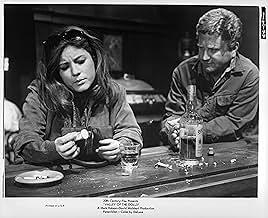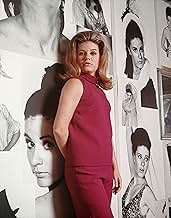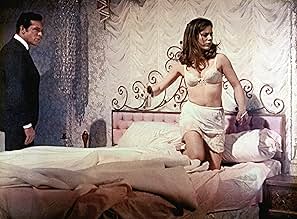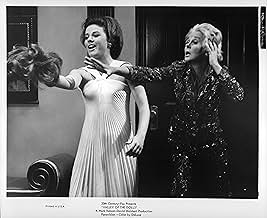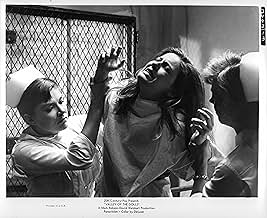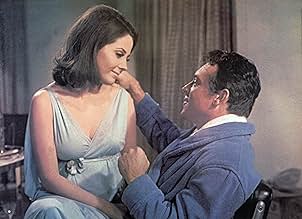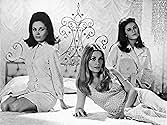AVALIAÇÃO DA IMDb
6,0/10
10 mil
SUA AVALIAÇÃO
Versão cinematográfica do êxito de vendas de Jacqueline Susann, narrando a ascensão e queda de três jovens mulheres.Versão cinematográfica do êxito de vendas de Jacqueline Susann, narrando a ascensão e queda de três jovens mulheres.Versão cinematográfica do êxito de vendas de Jacqueline Susann, narrando a ascensão e queda de três jovens mulheres.
- Direção
- Roteiristas
- Artistas
- Indicado a 1 Oscar
- 6 indicações no total
Alexander Davion
- Ted Casablanca
- (as Alex Davion)
Dionne Warwick
- Theme Song Singer
- (narração)
Sherry Alberoni
- Neely O'Hara
- (narração)
- (não creditado)
- Direção
- Roteiristas
- Elenco e equipe completos
- Produção, bilheteria e muito mais no IMDbPro
Avaliações em destaque
This is it, kiddies, the Grande Dame of camp classics. The sheer ineptitude of everyone involved is staggering. Mark Robson directs without a trace of nuance or subtlety; Patty Duke and Susan Hayward come off as boozy drag queens; Sharon Tate and Barbara Parkins look and act as if they had taken one downer too many; Dory and Andre Previn's musical numbers are as funny as those in "The Operetta"--the "I Love Lucy" episode which parodied musical theater; Billy Travilla concocts some of the most glamorously god-awful gowns ever seen; and Kenneth (of Hairstyles by Kenneth, of course) must be personally responsible for the hole in the ozone layer, so lacquered, teased and towering are his creations. But, you know what? IT ALL WORKS. The source material--Jacqueline Susann's groundbreaking, scandalous novel--begs for sledgehammer direction, overripe acting and eyepopping fashions. Certainly, subtlety was not a hallmark of Jackie's work. If anything, VOTD should have been even MORE over-the-top. Due to restrictions of the time, the film is sadly devoid of such juicy plotlines as Jennifer's lesbian affair, Tony's preference for - ahem - rear-entry intercourse, and Neely walking in on Ted Casablanca's tryst with another man. What we have, instead, is an endlessly entertaining piece of cinematic trash that is nowhere near as racy as it would like us to believe; and that's part of its twisted charm. Because it fails on so many levels--as true art, as explicitly sexual titillation, or as a faithful adaptation of a popular book--it's downright inspiring that it comes together so brilliantly. VOTD's ultimate triumph is that, despite its incredible waste of talent, time and money, 30 years later, we're still watching.
Viewers who like this film like it mostly because it is such a campy mess. Its main entertainment value lies in the unintended humor that results from cinematic incompetence. The main problem is the screen story.
For one thing, the character arc of Neely O'Hara (Patty Duke) is totally not credible. She's a singer who can't sing. Yet, she inexplicably goes from rags to riches on her singing ability alone. In the process, her personality morphs from sweet young thing to jaded and embittered has-been who barks and scowls at everything and everyone. Pills or no pills, her transformation does not ring true.
In addition, the film's poor plotting renders a story that is at times muddled. The plot darts and flits from one girl to the next; it spurts and sputters in a disconnected sort of way, without viable transitions. And some scenes are included evidently just to convey story exposition. A big part of the on screen time for the Jennifer character (Sharon Tate), for example, consists of three separate, and awkward, phone conversations with her mother. Other methods of explaining detail and advancing the plot would have worked better.
And the film's dialogue is campy, simply because it contains almost no subtext. It's so in-your-face, so lacking in subtlety, that some of it just reeks of junior high school theatrics.
Aside from the screen story, the overall acting is not very good. Patty Duke, in particular, is just downright awful. She shouts, she screams, she exaggerates her facial expressions in ways that are totally out of sync with the dialogue and the plot.
And the film's musical numbers are something else, especially when Susan Hayward attempts to lip sync a ghastly song called "I'll Plant My Own Tree", surrounded on stage by brightly colored fake leaves that whirl around her. The sequence is made even more ludicrous because the audience cheers wildly at the awful performance.
I guess I can't really fault the visuals, since bright colors were so trendy in the 1960s. Still, the visuals do make the film look dated. Those garish costumes and hairdos, that garish makeup, and that garish decor provide just one more reason to sneer at the film.
The only thing worthwhile here is the appearance of lovely Sharon Tate. And the film's sad theme song is professionally done. Otherwise, apart from its unintended humor, "Valley Of The Dolls" is suitable mainly as a lesson for aspiring filmmakers. In a book on film-making, this film could head the chapter: "Don't Let This Happen To You".
For one thing, the character arc of Neely O'Hara (Patty Duke) is totally not credible. She's a singer who can't sing. Yet, she inexplicably goes from rags to riches on her singing ability alone. In the process, her personality morphs from sweet young thing to jaded and embittered has-been who barks and scowls at everything and everyone. Pills or no pills, her transformation does not ring true.
In addition, the film's poor plotting renders a story that is at times muddled. The plot darts and flits from one girl to the next; it spurts and sputters in a disconnected sort of way, without viable transitions. And some scenes are included evidently just to convey story exposition. A big part of the on screen time for the Jennifer character (Sharon Tate), for example, consists of three separate, and awkward, phone conversations with her mother. Other methods of explaining detail and advancing the plot would have worked better.
And the film's dialogue is campy, simply because it contains almost no subtext. It's so in-your-face, so lacking in subtlety, that some of it just reeks of junior high school theatrics.
Aside from the screen story, the overall acting is not very good. Patty Duke, in particular, is just downright awful. She shouts, she screams, she exaggerates her facial expressions in ways that are totally out of sync with the dialogue and the plot.
And the film's musical numbers are something else, especially when Susan Hayward attempts to lip sync a ghastly song called "I'll Plant My Own Tree", surrounded on stage by brightly colored fake leaves that whirl around her. The sequence is made even more ludicrous because the audience cheers wildly at the awful performance.
I guess I can't really fault the visuals, since bright colors were so trendy in the 1960s. Still, the visuals do make the film look dated. Those garish costumes and hairdos, that garish makeup, and that garish decor provide just one more reason to sneer at the film.
The only thing worthwhile here is the appearance of lovely Sharon Tate. And the film's sad theme song is professionally done. Otherwise, apart from its unintended humor, "Valley Of The Dolls" is suitable mainly as a lesson for aspiring filmmakers. In a book on film-making, this film could head the chapter: "Don't Let This Happen To You".
In spite of the harsh user comments regarding this film, it is an entertaining and thought provoking late 1960's film. The criticism of Patty Duke's performance seems to me to be at least somewhat unfair and exaggerated. In my opinion, she does an admirable job with her character and handles the role of a star who is struggling with the pressures of fame. It is really quite uncomfortable to watch this film in the present day, if one already is keenly aware of the horrible fate that is in store for Sharon Tate, at the hands of Charles Manson's drugged-out groupies. Not a great film, but much better than the users here would have you believe.
The film adaptation of Valley of the Dolls is stupid, empty, overly melodramatic...and a lot of fun!
Jacqueline Susann's 1966 novel is my all-time favorite, and her gritty, glossy pulp material was severely diluted for the big screen. That is the main problem. Too many punches are pulled, the characters are sweetened up, and a completely ridiculous happy ending (which Jackie hated) is substituted for the book's bleak, satisfying conclusion. Mark Robson's film has none of the spirit of its basis.
With that out of the way, the movie is very enjoyable for what it is: An unintentional laugh riot. The dialogue is hilarious and eminently quotable--"Boobies, boobies, boobies! Nothin' but boobies! Who needs 'em? I never had any! Didn't hurt me none!" Most of the supposedly "dramatic" and "touching" scenes are a scream. Patty Duke is priceless as the speech-slurring, tantrum-throwing, self-destructive Neely O'Hara. Watch her flailing around during the "It's Impossible" number; notice the embarrassing position of her beads. Barbara Parkins seems to have taken one Seconal too many before shooting, as she appears to be completely anesthetized. Susan Hayward gets to bellow a lot, fight with Duke, and get her wig thrown into a toilet in the most famous scene. The only one who comes off really well is Sharon Tate, a talent who never got the attention she deserved in life. Hers are the only genuinely affecting moments in the film, especially her final scene.
The candy-colored photography is good, beautifully capturing the glossy red capsules taken at every turn. The hair and fashions are glamorous--and so is the hairspray can! Dionne Warwick sings the beautiful theme, and the rest of the songs are enjoyably silly. I have the soundtrack LP--TWO copies! In conclusion, the ultimate camp classic! I'm off to take another doll now....
Jacqueline Susann's 1966 novel is my all-time favorite, and her gritty, glossy pulp material was severely diluted for the big screen. That is the main problem. Too many punches are pulled, the characters are sweetened up, and a completely ridiculous happy ending (which Jackie hated) is substituted for the book's bleak, satisfying conclusion. Mark Robson's film has none of the spirit of its basis.
With that out of the way, the movie is very enjoyable for what it is: An unintentional laugh riot. The dialogue is hilarious and eminently quotable--"Boobies, boobies, boobies! Nothin' but boobies! Who needs 'em? I never had any! Didn't hurt me none!" Most of the supposedly "dramatic" and "touching" scenes are a scream. Patty Duke is priceless as the speech-slurring, tantrum-throwing, self-destructive Neely O'Hara. Watch her flailing around during the "It's Impossible" number; notice the embarrassing position of her beads. Barbara Parkins seems to have taken one Seconal too many before shooting, as she appears to be completely anesthetized. Susan Hayward gets to bellow a lot, fight with Duke, and get her wig thrown into a toilet in the most famous scene. The only one who comes off really well is Sharon Tate, a talent who never got the attention she deserved in life. Hers are the only genuinely affecting moments in the film, especially her final scene.
The candy-colored photography is good, beautifully capturing the glossy red capsules taken at every turn. The hair and fashions are glamorous--and so is the hairspray can! Dionne Warwick sings the beautiful theme, and the rest of the songs are enjoyably silly. I have the soundtrack LP--TWO copies! In conclusion, the ultimate camp classic! I'm off to take another doll now....
I must be crazy. Just after watching this movie, I got on IMDb to see what its rating was, and, honestly, I was expecting something a lot higher. I don't consider this movie a turning point in the film industry, but I certainly wouldn't call it bad. It's not bad. I didn't notice any flaws in the acting (which is the principle instrument for telling a movie's story)---I personally thought that Patty Duke's performance was amazing. The storyline intrigued me, and I liked the characters---especially Barbara Parkins' Anne, who I felt myself relating to by the end of the movie.
Like I said, I must be crazy. I wouldn't say this is the best movie ever made, but I thought it was rather good. I'd sit through this any day before I'd watch LORD OF THE RINGS. I guess I must have missed the horrid atrocities of this film. I'd recommend it to anyone with an interest in the darker side of show biz'.
Like I said, I must be crazy. I wouldn't say this is the best movie ever made, but I thought it was rather good. I'd sit through this any day before I'd watch LORD OF THE RINGS. I guess I must have missed the horrid atrocities of this film. I'd recommend it to anyone with an interest in the darker side of show biz'.
Você sabia?
- CuriosidadesDirector Mark Robson had a very combative relationship with all his actresses, particularly singling out Sharon Tate for his harsh treatment. Patty Duke hated working with him, and years later, after his death, still called him "a mean son of a bitch".
- Erros de gravaçãoWhen Neely is tap dancing on the table, shown by her shadow on the wall, the shadow does not reflect a pony tail, but when she jumps down, she has a pony tail.
- Citações
Neely O'Hara: Boobies, boobies, boobies. Nothin' but boobies! Who needs 'em? I did great without 'em.
- ConexõesEdited into Intimate Portrait: Patty Duke (2001)
Principais escolhas
Faça login para avaliar e ver a lista de recomendações personalizadas
- How long is Valley of the Dolls?Fornecido pela Alexa
Detalhes
- Data de lançamento
- País de origem
- Idiomas
- Também conhecido como
- El valle de las muñecas
- Locações de filme
- Redding Center, Connecticut, EUA(Welles' Home in Lawrenceville)
- Empresa de produção
- Consulte mais créditos da empresa na IMDbPro
Bilheteria
- Orçamento
- US$ 4.690.000 (estimativa)
- Tempo de duração2 horas 3 minutos
- Cor
- Proporção
- 2.35 : 1
Contribua para esta página
Sugerir uma alteração ou adicionar conteúdo ausente

Principal brecha
By what name was O Vale das Bonecas (1967) officially released in Canada in French?
Responda




